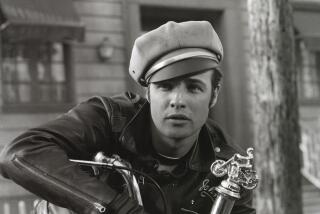Old blood
- Share via
Sylvester Stallone’s return, at age 61, to his war-weathered John J. Rambo role may be easily explained. Like the upcoming fourth “Indiana Jones” film and Stallone’s own critically applauded “Rocky Balboa” of 2006, it combines the baby boomers’ determination never to yield an inch of American culture to the young with aging producers’ faith that there’s still plenty of sizzle in franchises that in fact have little appeal to anybody under the age of 100. Sometimes that faith pays off: “Long Road Out of Eden,” the seventh studio album from the Eagles (average age, 60) sold a million copies in its first two weeks.
But Rambo is such a vexed, iconic figure that his return, in a fourth film scheduled for release in January, demands further explication. The troubled veteran (of a war so far in the past only the most senior officers in the current war remember it) became in the 1980s a byword for American callowness, belligerence and media-saturated self-delusion. To this day, foreigners -- charming people, or so we’re told -- tirelessly condemn the “Rambo mentality” that drives the United States into new catastrophes while rewriting past debacles as inspiring victories.
Stallone has never made an easy target for those critics, however. A thoughtful, self-critical filmmaker who still nurses a dream of doing a bio-pic on Edgar Allen Poe, a Rimbaud movie apparently being too on-the-nose, Stallone has veered unpredictably between self-reinvention as a serious artist and ever-more-cartoonish self-parody. For every “Judge Dredd,” he delivers a “Cop Land”; for every improbable feat Rambo has pulled off, his portrayer has delivered an insightful critique (most notably in his conversations with Susan Faludi for her 1999 book, “Stiffed”) of the culture’s absurd and impossible expectations of its heroes.
For the new film, Stallone appears to be splitting the difference. Rambo, it turns out, has spent two decades in a state of profound torpor, living as a hermit who, Stallone told USA Today, “realizes his entire existence has been for naught.” We suspect Rambo will rediscover his sense of purpose before the end of the movie -- which will send the pneumatic commando into action in Myanmar, on a mission seemingly designed to avoid offending either the left or the right. But Stallone’s discomfort, a sense of emptiness papered over by fits of bravado, stays with us because it is America’s discomfort. Rambo’s fans and his critics are in interesting agreement that he embodies a particularly American way of acting out. At Stallone’s age, such behavior is dangerous, though it may be fitting. The United States is still fond of new international adventures, but as the Social Security tables and the box office make clear, this is not a young country anymore.
More to Read
Only good movies
Get the Indie Focus newsletter, Mark Olsen's weekly guide to the world of cinema.
You may occasionally receive promotional content from the Los Angeles Times.










